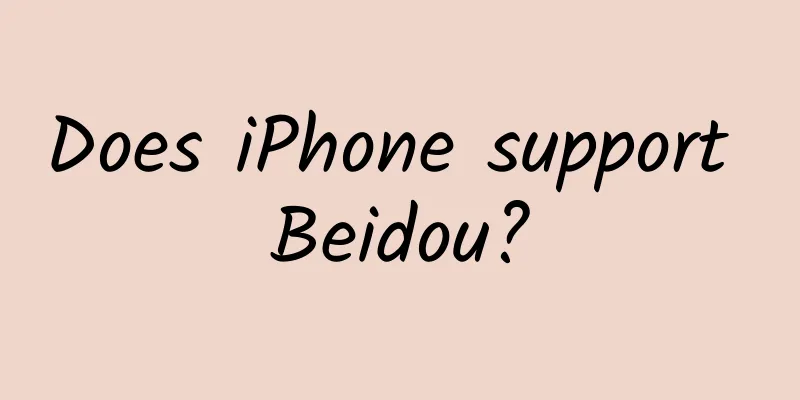Does iPhone support Beidou?

|
What is Beidou? We all use mobile phones every day. On current smartphones, all functions related to positioning use satellite navigation systems. my country's Beidou Satellite Navigation System (BDS or Beidou), the US GPS system, the Russian GLONASS system and the European Union's Galileo system are the four core suppliers of the Global Navigation Satellite System (GNSS) recognized by the United Nations International Committee on Global Navigation Satellite Systems.Since the four major GNSS systems have already carried out coordination on compatible sharing of frequency bands and data formats, the positioning solutions currently used in mobile phone products generally support satellite signals of these systems at the same time, because they do not increase any software or hardware costs. For users, it doesn’t matter which system’s signal is used. For example, when you use electrical appliances, you don’t care whether the electricity on the grid is wind power, hydropower, thermal power, nuclear power, solar power, or power generated by love. There is another point of knowledge: Beidou has never officially made mobile navigation and map apps. All navigation and map apps named "Beidou" are counterfeit products. Beidou has just been completed?On June 23, the last global networking satellite of the third-generation BeiDou positioning system, BeiDou-3, was launched into space. On June 30, it was successfully positioned in geosynchronous orbit and entered long-term operation management mode the next day. So far, the deployment of 30 BeiDou-3 global satellite navigation system has been completed. The next step is to conduct joint debugging and testing of the entire BeiDou system. Prior to this, the second-generation BeiDou positioning system, BeiDou-2, completed the launch and networking of 14 satellites at the end of 2012 and has been providing services to the world. The BeiDou-3 system has started providing services after the basic system was completed at the end of 2018. What does this mean? The Beidou navigation system has been available for a long time, but it has not been fully developed in terms of performance, positioning accuracy, and functions. It should be emphasized that all scenarios discussed in this article are limited to the basic application of mobile phones passively receiving positioning signals. Other powerful functions of the Beidou system will not be discussed today. Does my phone support BeiDou?As mentioned earlier, in recent years, mobile phones on the market all support multiple navigation systems. Users can use the one with the best satellite signal and do not need to worry about this issue. However, when reading Beidou-related news these days, many media outlets have mentioned that "iPhone does not support Beidou." Moreover, all such news reports did not provide the source of the information or solid evidence. The iPhone has a considerable market share, but none of its models support BeiDou, which is quite counterintuitive. As a former mobile phone product manager, I became interested in this issue and planned to spend some time to research it. To understand this, there are three perspectives:
The research started happily, but it hit a snag at the first step. Proud AppleOpen Apple's official website, select "iPhone" at the top, and then select "Compare Models" at the bottom. You can select all models starting from iPhone 6 in the three drop-down menus to see their parameter comparisons. From here you can see that from the iPhone 6 to the latest iPhone 11 series, in the category of "Cellular Network and Wireless Connection", the function description about positioning is "Built-in GPS/GNSS". As mentioned above, GNSS includes BeiDou, GPS, GLONASS, and Galileo. Apple's description is very vague and obviously insufficient.On Apple's official website, click "Technical Support" at the top, then scroll down to the bottom of the page, click "Technical Specifications" in the "Resources" column, and then select "iPhone" in the product catalog to view more detailed technical specifications of each model. Here you can check the specifications of all models starting from iPhone 3GS. The results are as follows:
It is worth noting that iPhone 8 and iPhone X, as well as iPhone XS and iPhone XR, are products of the same generation. Their radio frequency hardware is exactly the same, but their descriptions of positioning functions are inconsistent.I tried another approach: calling Apple’s 400 number and consulting Apple’s official technical support. The result was not helpful. The customer service staff at Apple's 400 phone line also answered users based on the above technical specifications on the official website. Regarding my question "Since the document does not list support for Beidou, can it be considered that this model does not support Beidou?" the 400 customer service staff replied that they could not confirm whether the functions that were not listed were supported. Unlike Android phone manufacturers, Apple has always disclosed limited hardware information to the public, and has never officially disclosed the RAM capacity of its phones. It seems that this path is no longer viable. The third party that hits the wallReaders who have read this may say, why not just install an app to test whether the iPhone can receive Beidou signals? Why make it so complicated? If you want to check the navigation satellite status of your location on an Android phone, you can install an app to do it. I used the AndroiTS GPS Test app, and the results of running it on a Huawei flagship model are as follows: However, the location service provided by iOS to App developers only contains location data, not satellite data. Therefore, on iPhone, it is impossible to view the current satellite type, signal strength and other information through App. Apps such as GNSS View on the App Store actually obtain star map information through the Internet, not provided by the phone and operating system. Another way of thinking is to look at the third-party test report. As a kind of electronic equipment and network communication equipment, mobile phone products have certification and testing requirements in various countries before they are put on the market. The specific types of certification are 3C and CTA in China, FCC and PTCRB in the United States, and CE and GCF in Europe. However, such certification tests do not involve mobile phone positioning, which is a functional unit that only receives but does not transmit signals, and there is no public access to the certification report. As for the individual tests on the mobile phone positioning function, they are currently completed by manufacturers and suppliers themselves, and no similar test conclusions have been found based on search engines. Another hardcore way is to find a microwave darkroom (RF signal shielding room) and Beidou simulated signal source to complete the test yourself. As of the completion of this article, I have not been able to get the equipment required for personal testing, so I will blame the epidemic for this. Hardware parameter studyWhether a mobile phone supports Beidou is ultimately a hardware issue. The last resort is to study the chip function. Although Apple does not announce specific hardware plans, fortunately there are some institutions at home and abroad that will disassemble each generation of iPhone, which leaves a way for our research. Before starting this section, let's take a look at the general architecture of mobile phone hardware: The above picture comes from the official website of Murata, one of Apple's suppliers. As can be seen from the picture, the GNSS module of the mobile phone is a hardware function independent of the CPU. The CPU receives the position data calculated by the GNSS module and satellite-related information. In the design of iPhone, CPU and communication baseband are two independent chips. Starting from iPhone 4, the CPU uses Apple's self-developed A series, while the communication baseband supplier changed from Infineon in the early days to Qualcomm in iPhone 4 CDMA version, and then Qualcomm was fully adopted in iPhone 4s. Later, Intel was introduced in iPhone 7 overseas version, and Intel was used until iPhone XS. The new models released this year will return to Qualcomm. By the way, Intel's communication baseband business was acquired from Infineon, and the business was acquired by Apple in the second half of last year. It is foreseeable that Apple will bring this solution back to the iPhone in a few years. Back to the topic of satellite positioning. Some mobile phone manufacturers, such as Huawei, use independent chips that combine WiFi, Bluetooth and GNSS. However, the Qualcomm and Intel basebands used by Apple integrate GNSS modules, and WiFi and Bluetooth are handled by a separate chip. Therefore, to confirm whether the iPhone’s hardware supports Beidou, we need to see whether the basebands of Qualcomm and Intel support Beidou.From iPhone 6 to now, there are eight basebands involved in the six generations of iPhone (iPhone 7, iPhone 8/X use both Qualcomm and Intel basebands). The relevant documents are not listed one by one. If you are interested, you can go to Qualcomm and Intel official websites to check. All Qualcomm 4G LTE basebands, including those used in iPhones, support four GNSS solutions including Beidou. The four generations of iPhone, iPhone 7, iPhone 8/X, iPhone XS/XR to iPhone 11/SE2, use Intel basebands of the XMM series 7360, 7480, 7560, and 7660. The product brief of the official website of the latter two models clearly stated that they support four GNSS solutions including Beidou, while there is no specific information about the positioning function of the first two models. Unfortunately, due to the acquisition by Apple, the detailed technical documents of the XMM series chips on Intel's official website have been hidden. Fortunately, the XMM 7360 chip is used in the Fibocom L850-GL LTE module, which is widely used in many notebook products such as Lenovo, Dell, and HP. This module has detailed parameters on the Fibocom official website and supports four GNSS solutions including Beidou. Intel's four generations of chips in the same series all support Beidou, so there is no reason why the 7480 generation would not support it. So we can say that all 4G iPhones have hardware that supports BeiDou. As in the previous example of wind power and hydropower, the CPU directly obtains location information from the baseband, and does not care which satellite system's signal calculation is used to obtain the location.But does this mean that these iPhones use Beidou’s satellite signals? According to information provided by a former colleague of mine, Apple’s internal documentation system shows that due to certain performance issues (possibly from the satellite system or the mobile phone’s RF front-end), Apple required baseband manufacturers to modify the software to block Beidou data on some older iPhone models. In layman's terms, the iPhone can receive Beidou signals on these models, but the baseband software does not consider data from Beidou satellites when calculating the position. He was unable to specify which models were affected by this modification. But he said that the iPhone 11 generation can clearly use Beidou signals. To sum upDue to time and conditions, this is an imperfect study. However, after integrating various data, we can at least draw the following conclusions:
|
<<: Hardcore test: 41 out of 50 mainstream apps are "peeking" at your clipboard
>>: WeChat has been updated again! Tap is more interesting, and there are 4 new changes
Recommend
Case sharing: How to use red envelope fission promotion to increase APP downloads?
The gameplay of the expanding red envelope is ver...
Is there a bug in iOS 17.5? Users’ private photos reappear after being deleted!
This Tuesday, Apple pushed an update to the offic...
Why do mobile phones become slower and slower as they are used? Is it the manufacturer who is behind this?
If someone told you 5 years ago that a mobile pho...
Preliminary plan for market research on the promotion and operation of the Internet finance P2P network!
This plan was made after I recently had an interv...
First Prize for Primary School Student's Cancer Research Paper Revoked (Attached with Full Notice)
First prize for primary school student's canc...
Is it cheap to rent a BGP server room?
Is it cheap to rent a BGP server room? The BGP co...
What does China National Grain and Oils Corporation say in response to the ban on outsiders bringing mobile phones into grain depots?
On the evening of August 2, the China National Gr...
How to attract new members and convert them into new members in the community?
As community operations are mentioned more and mo...
Why does ofo invest in advertising while Mobike does public relations?
To date, ofo and Mobike have been fighting for ne...
How much does it cost to customize the Tai'an Movie Mini Program? What is the price quote for Tai'an Movie Mini Program customization?
More and more businesses are paying attention to ...
How to make a good online event promotion plan?
In marketing psychology, herd mentality, greed fo...
React Native touch event processing detailed explanation
Touch is the core function of mobile devices and ...
Three steps of product operation: attracting traffic, retaining users, and being active
A very good single male friend of mine once made ...
What problems does the monthly card function launched by ofo solve?
Currently, there are three entrances to ofo’s bik...
When is the rainy season in 2022? When exactly does the plum rain season begin? Attached is the latest start and end time of the plum rain season in 2022
The first day after the May Day holiday this year...









